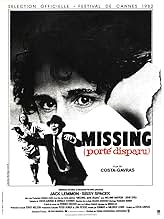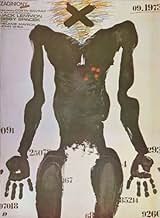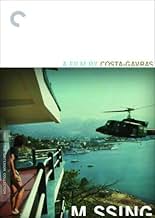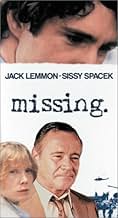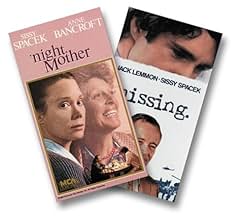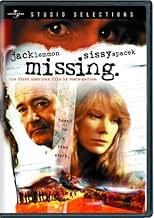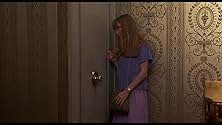When an idealistic American writer disappears during the Chilean coup d'état in September 1973, his wife and father try to find him.When an idealistic American writer disappears during the Chilean coup d'état in September 1973, his wife and father try to find him.When an idealistic American writer disappears during the Chilean coup d'état in September 1973, his wife and father try to find him.
- Won 1 Oscar
- 12 wins & 23 nominations total
- Paris
- (as Martin Lasalle)
Featured reviews
Adapted by Costa-Gavras and Donald Stewart from Thomas Hauser's non-fiction book documenting the true case, the plot focuses on American expatriate Charles Horman whose sudden disappearance in the days after the Pinochet coup brings together two familial adversaries, his wife Beth and his father Ed, who has flown in from New York. Charles and Beth had been leading a vagabond existence with his work in children's animation and their relatively passive support of Allende's reform measures. Charles' back story is revealed in carefully constructed flashback episodes that show him to be curious about the presence of U.S. military personnel in the area. Once he disappears, Ed and Beth seek help from the U.S. Consulate but face a seemingly insurmountable wall of bureaucracy. Frustrated, Ed, a highly conservative Christian Scientist, lashes out at Beth for what he considers her undesirable influence over his son. However, as they absorb the scope of the violence and the culpability of the U.S. government, they bond intractably toward their objective of finding Charles.
For once, Jack Lemmon, unafraid to convey his character's prejudices, is able to use his neurotically coiled energy in a suitable dramatic role as Ed. The result is a startlingly raw performance that ranks among his best. Sissy Spacek is terrific as Beth, though her character does not experience as big an arc of self-revelation. In the elliptical flashback role of Charles, John Shea provides solid support, as do Janice Rule as a political activist and a number of familiar TV faces - Melanie Mayron as friend Terry and David Clennon as U.S. consul Phil Putnam, both from "thirtysomething", and Joe Regalbuto, Frank from "Murphy Brown", playing another Frank, a possible victim of the coup. There are unfortunately no extras with the 2004 DVD.
The film itself remains a gripping eyeopener from first to last. Costa-Gravas is especially good at recreating the abject terror of fascist rule: where long hair is forbidden and women are forced back into skirts, where people are present one minute and gone the next, where a democratically elected government is present one minute and gone the next, and where a Henry Kissinger can do the behind-the-scenes dirty work and be honored for it (not in the movie, but true nevertheless). The acting is first-rate, and a tour-de-force for Lemmon in particular. Ditto, the often overlooked Charles Cioffi who puts the real chill in the confrontation scene. Two complaints: the arch symbolism of the riderless white horse conflicts with Costa-Gravas's documentary approach, and why, oh why, did they have to make Horman's son so cuddly. The audience gets the point without spooning on the sugar. Anyhow, this remains a fine piece of revelatory film-making and retains as much relevancy for today's audience as it did twenty years ago.
This film won an Oscar for Best Screenplay. It was also nominated for Best Actor (Jack Lemmon), Best Actress (Sissy Spacek) and Best Picture. I am surprised that "Gandhi" won the Best Picture award that year--especially since the film was, in many ways, quite inaccurate historically (I am a history teacher--trust me on this one). "Missing" was a better film--as were "The Verdict", "Tootsie" and "ET" (in my semi-humble opinion). I wonder if perhaps the film's politics doomed it to lose--though considering Hollywood generally DOES run left, this may not be the case.
I am a reasonably conservative American, though I feel ashamed when I see films like "Missing" (as well as Costa-Garvas' other famous film, "Z"). While I am glad that the US had been traditionally anti-communist, this single-minded approach to international communism appears VERY misguided in hindsight. In too many cases, in order to combat this, the US government sponsored repressive and evil regimes--when they should have been pushing for self-determination and freedom. No matter how you try to excuse this, situations like the ones in "Missing" are simply inexcusable and the film should be seen by everyone--not just those on the left politically. Why? Because, the story in this case is TRUE--the situation involving the Pinochet regime in Chile was just plain evil--and should NOT be forgotten or ignored. History should be understood and lessons learned from them...or they'll be repeated. Well worth seeing and very well made overall.
Govras chose as background for his film the actual diaries of Charles Horman, a lefty artist type who was living with his wife Beth in Chile. Horman had apparently picked up the unfortunate habit of inquiring into some dangerous affairs in a rather loud way. Isolated in every sense from any "live" political current, his disappearance and murder were relatively easy to accomplish, even though he was a United States citizen. The actor John Shea portrays Charles Horman as a naive sort, and there is no reason to assume this was an inaccurate depiction. Most citizens of the United States overseas are sheltered from the skulduggery of realpolitik, and most cling to some rather dangerous illusions about how far their rights as citizens actually extend. U.S. citizens in Lebanon who had to pay for their removal from that combat front last summer have learned this the hard way recently.
Jack Lemmon is stellar as Charles' father Ed Horman, who made the trip to Chile under the impression that he had rights his government felt bound to respect, and who discovered otherwise. And Cissy Spacek is never anything less than full marks as Beth Horman.
MISSING accomplishes what few political dramas do. It asks its viewer to consider the human dimensions and costs of an imperial political reality, and it portrays with a deadly earnestness what these ideas do to people caught up in the sway of such notions. There are no monsters in MISSING, just people who are doing their jobs and following orders. And therein lies the horror, one which all too many of our fellow citizens have yet to come to grips with. It is a rare feat among political films, an actual work of art. But don't be surprised if you need a stiff drink after viewing it. That's how I felt when I first saw this work after its release in 1982, and it still has that effect upon me today.
Directed by Costa-Gavras, Missing is a film that seems to care more about informing the world of this gross injustice, rather than do anything particularly entertaining for it's audience. Opening with the statement that the events of the film are true and left unchanged, there is certainly an air of importance added to their search, always leaving the audience aware of the real life consequences of this crime. It's a condemnation of government and negligence, much like Gavras' earlier film Z, but it's much more about the emotional conflict of Ed Horman than it is about trying to thrill it's audience.
Beth and Charlie were idealists, some could even say radical liberals, but Ed was a very conservative man who shunned their attacks on the government. He was a man who believed in what his nation stood for and through the beginning of the film he is constantly giving them the benefit of the doubt, trusting that they are not being lied to. The brilliant evolution that occurs in this film is in the way that Ed slowly comes around more to Beth's way of thinking; they start off on opposite sides but gradually come together as he begins to form a distrust in the U.S. government in Chile and a rage inside of him grows.
Lemmon's performance stands among his best, slowly developing a more angered and combative streak in Horman, but never losing sight of the fact that this is ultimately just a man who wants his son back. There's a scene late in the film where he is pleading for his son, practically on his hands and knees, not caring if he is dead or alive he just wants his son so he can return home, that is absolutely devastating. Lemmon and Gavras succeed admirably in bringing this heartbreaking story to the public eye, made even more wrenching when the final truth is revealed (or even more so if you read up on the events that occurred after the film was released).
Did you know
- TriviaDuring the Pinochet dictatorship, which ran from 1973 to 1990, this picture was banned in Chile.
- GoofsWhen Ed Horman is at the State Department trying to get information about Charlie, there is the presidential portrait of Richard Nixon on the wall in the background and a more personal photo of him on Marine One on the credenza behind the desk. That photograph, with fingers in the V-peace sign, was taken upon his final departure from the White House in 1974 and could not have been on someone's desk in 1973.
- Quotes
Consul Phil Putnam: Please try to understand. There are so many cases. They're all so important, and this isn't the only one we're working on.
Ed Horman: It's the only one I care about.
Consul Phil Putnam: You and a lot of other people. Listen, I've never seen so many cables from Washington. What kind of pull do you have up there anyway?
Ed Horman: I'm an American citizen.
- SoundtracksMy Ding a Ling
(1952)
Written by Chuck Berry (uncredited)
Performed by Chuck Berry
Courtesy of All Platinum Records, Inc.
Details
- Release date
- Countries of origin
- Languages
- Also known as
- Desaparecido
- Filming locations
- Acapulco, Guerrero, Mexico(as Vina del Mar)
- Production companies
- See more company credits at IMDbPro
Box office
- Budget
- $9,500,000 (estimated)
- Gross US & Canada
- $14,000,000
- Gross worldwide
- $14,000,000
- Runtime
- 2h 2m(122 min)
- Color
- Aspect ratio
- 1.85 : 1


